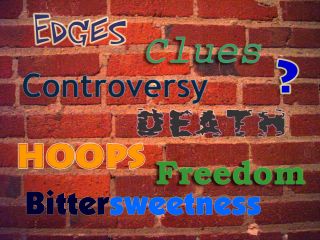
For several months now I’ve been trying to coax my wife, Lindsay, into writing a guest post. Besides being my better half, she’s a thoughtful commentator and often prompts me with ideas that end up evolving into posts. It seemed only natural that she should have some kind of presence here.
The issue became more urgent when I created a “Lindsay” tag for sorting my posts with del.icio.us. Now my wife’s bloggy shyness has caused a crisis. Her category is under-populated, basically screaming for more entries. Someone has to step forward and produce.
I guess that would be me.
In lieu of Lindsay’s reluctance to blog, I feel compelled to write something on her behalf. Really, I have no choice. I sense considerable risk in the air as I embark on this undertaking—but what can I say? I’m just glad it’s not my reputation and persona that’s at stake. On the upside, there’s always the chance that if I say something provocative enough, Lindsay will decide to speak up for herself. (Remember, honey, you could have prevented all of this with a quick 3-paragraph blurb.)
At present, I am home alone. It seems a perfect time for my first “Lindsay” post. First, some kind of quick overview seems necessary.
Vital Facts About Lindsay
She has brown hair
She’s a multi-talented artist
She’s taken
Hmm. I’m not sure that quite captures her. But I can’t spend too much time second-guessing myself. Onward!
A Quick Backstory
Lindsay characterizes her life before marrying me as “entirely free of sarcasm” but also lacking in some of the more refined pleasures. The former fact caused an exciting period of readjustment as Lindsay acquired an ear for satirical quips and learned to dish them out herself. The latter required a brief but intense indoctrination phase; consequently, Lindsay acquired a passion for KU hoops and a mild tolerance for coffee. I, of course, did not escape without making adjustments myself. I’m just not mentioning them now because this post is about Lindsay, right?
A Diamond in the Rough
In all fairness, Lindsay should be a Broadway diva. She has an incredible voice, earned all kinds of leading theater roles in college (B.A. in Musical Theater), and, accordingly, often busts out with hilarious impersonations. That’s the diamond part. The rough part is that she’s living in a downtown loft with me, substitute teaching for pocket change as I make my way toward a Master of Divinity degree (theology). But that’s the price you pay when you marry a penniless student/author. For love. Not that I blame her, but still. Fortunately, she doesn’t feel too bad about it.
Furthermore
I think I just heard a key turning in the front door. This will have to be continued. I’m out.
Friday, September 30, 2005
How the Other Half Lives
Posted by
AJ
at
12:24 PM
5
comments
![]()
Thursday, September 29, 2005
Camera Captures Catastrophe

Who would have thought this trip would end in sorrow?
It seems that tragedy has struck our little home.
It all began several years ago when Lindsay and I scaled an incredible array of sand dunes the size of mountain foothills. High winds blew sand through the air at such frequent intervals that we could scarcely help inhaling it. We could hardly have foreseen the residual effects of this climate.
On the trip we carried our trusty Sony Cybershot F707 digital camera, capturing our ascent into gorgeous aridity. As a result, the circumstances of the climb were well documented. Now, each time I see one of those photographs, I feel my heart sink. Looking back, I feel sure that it was that fateful trip that caused the long, downhill slide toward total physical breakdown.
As I write, the patient lies on the futon behind me. Bodily functions are restricted to a bare minimum, and an operation may not prove conclusive. How severe are the injuries? Several crucial ligaments have deteriorated. It seems that the Colorado sand worked its way inside and never came out. Unseen, unheard, the grit has been eating away at internal organs for the last three years. Lindsay and I both feel the loss deeply.
I thought about inserting a PayPal link and pleading with you all to donate toward a new camera. The problem is, I’m not sure most of my readers occupy high enough income brackets to make this work. (A lot of you still live with your parents, right? ;) But I’d be lying if I said I’ve stopped toying with the idea…
Posted by
AJ
at
10:17 PM
5
comments
![]()
Wednesday, September 28, 2005
Pushed Into Glory
"Strength and Courage—Now Do It"
Last week’s “assignment” was to read the book of Joshua twice through, daring the Palestinian warrior to emerge in all his gory glory. He did—but his glory turned out not to be his at all.
It all started because Moses died. Moses was a legend, and therefore very hard to replace. As his heir apparent, Joshua’s position was unenviable. It’s no wonder that God needed to pull him aside for a talking to.
In the course of one transformative conversation, God urged Joshua three times to “be strong and courageous.” Strength and courage, strength and courage—the words began haunting Joshua then and there. Years later, if you asked him a question when he was leaning on his spear haft, dozing, he would rap out “Strength and courage” without fully waking up.
But at first, Joshua had to direct his energies toward persuading the Israelite people that he was their new head man. “Ok,” they told him. “But one thing: you’ve got to be strong and courageous.”
It was not the most auspicious beginning, but no one second-guessed Joshua’s grit down the road. His leadership potential had been, apparently, latent. Perhaps he was one of those formidable but unassuming types (like Viggo Mortensen in the first LOTR film). Whatever the case, God headed off Joshua’s tendencies to soft-sell the hard, cold issues confronting him. And the man’s fiery core blazed up and overawed an entire nation.
When all was said and done, no one made any bones about Joshua’s strength and courage. Israel decided he’d pretty much upheld the Mosean legacy, and everyone felt a sense of awe when Joshua came in view. His religious feelings were so, well, intense. And the man carried himself with an assured freedom. The more casual Israelite worshippers felt like he might put a spear through their throats if they so much as mumbled about skipping out on tabernacle services. Joshua’s views on God were so rigid.
This made for some uncomfortable conversations over coffee, but in the end, most all of Israel longed for a empowering speaking relationship with God—like Joshua’s.
And all this from a man whom Yahweh had prodded forward with the twin goads of “strength and courage.” Joshua radiated pure dynamism, but the glory wasn’t his. It never was. It never is.
Posted by
AJ
at
7:31 PM
4
comments
![]()
Poetry: Breakthrough

So I've been working on this poem, which Lindsay is not sure she understands. In fact, after casting a discerning eye over the thing, she concluded that she likes my rag poetry better. Since Lindsay seems to be a fairly consistent judge of poetic clarity, I was shaken. Maybe this won't be the poem that sends my name into orbit alongside T.S. Eliot.
But here it is. Not merely because I want a second opinion! Of course not. Such a motive would hardly justify an entire post. It was high time to post a poem anyway. Long overdue, in fact. So uh, let me know if it's entirely baffling. Attempting to experientially describe an encounter with deity is always risky.
Breakthrough
The world lurches invisibly!
A sudden clearing of the modish frequencies,
a blackout of the buzzing static channel,
so the oldest channel beams in all the stronger.
Stars swing
and from the bottom of an unseen funnel
I sit small and dumb,
a silent speck beneath swinging stars—
as planets shiver
(stellar leaves),
trembling in the predator’s wake.
Something gigantic circles,
framed by distant lights
then framing them,
immense, invisible,
behemoth surfacing
behind my back;
a ripple of moon water widens,
and shaken stars orbit mutely
in unabated horror.
I still remember the interval,
the darkly gleaming moment,
when life lulled in starlight.
An Arnoldian redux:
I, the “ignorant army”
clashed with night
but was redeemed;
given assurance.
(Beware raw experience!)
Yet there was a dizzying
swirl of Godhood:
stars churning,
my heart dropping,
the world infinitely simple,
awfully complex.
God in all,
above all;
a non-negotiable humility
engulfed me.
All questions stoppered,
misting myrrh uncorked.
And was this not God?
Posted by
AJ
at
3:17 PM
2
comments
![]()
Tuesday, September 27, 2005
Secret Plans for Greatness

The good news is that we have a cure for movie stars. The bad news is that it kills your average snob as well.
Funny thing about unabashed self-assertion. As much as it may annoy us in others, it seems we are strangely tolerant of it. The hot-head athlete, the glossed-over star, they may tick us off, but they seldom send us through the roof.
Otherwise, how come Hollywood and professional ballers are still in business?
My theory is that we treat human arrogance leniently because we know it’s inherently limited. It’s really all just a game, and however closely we may follow that game, we never really forget it’s just play. Smoke and mirrors. A huge masked ball. Because people get older, or they get dealt to a loser team, they play a stupid role, they get busted with marijuana, or land in a drunken fight… We know it’s only a matter of time until so-and-so’s personal luster wears thin.
There is, however, another reason for our clemency in the face of ego. We each have our own secret aspirations. You see, it would be foolish of me to deride Allen Iverson’s brashness when I hope to send my own NBA planet into orbit next week. Likewise J-Lo and the girl next door. We’re not dumb. Most of us won’t call our competition’s true weakness out too loudly, because that would sabotage our personal plan of attack.
So when I see Jones living like he’s a god, I may snicker, but I probably won’t really call him out. I’m more likely to sneer at his passé style than truly hit him where it hurts. (Hey Jones, you’re gonna die and worms’ll eat ya.) Why my reticence?
Because I know that, at some convenient point in the near future, I’m launching a face campaign of my own. We would all, when it comes down to it, prefer to have the face that launched a thousand ships—better yet, a thousand ESPY previews or People covers. Most of us think we’ve been robbed: If the world had 20/20 vision, it would be beating a path to my door.
The way I see it, the most direct way to demolish stuck-on-myselfness is the one route most of us will never take. In other words, only a really humble person could trash a truly conceited man. Because I must include myself in the remedy.
Our desire for unwarranted stardom, our secret I-wish-that-was-me-ness, prevents us from seeing arrogance with X-ray vision—seeing it as it is: A walking bag of bones draped in too-tight glittery clothing. Laughable, really. But we can’t afford to laugh too uproariously, because the joke is also on us.
I’ll sooner tolerate Jones’ insufferable arrogance—so long as it is mildly entertaining—than stifle my own. This painfully awkward phenomenon is what Jesus hinted at, I think, when he said, I have come in my Father's name, and you do not receive me. If another comes in his own name, you will receive him. How can you believe, when you receive glory from one another and do not seek the glory that comes from the only God? (John 5:43-44 ESV)
Christ pointed up our fundamental disconnect where glory is concerned. We're ready to tolerate almost anyone's self-assertion as long as it means they'll wink at our pretensions in due course. But bring deity, true glory, into the picture, and our homemade grandeur starts looking shabby. Pride screams out and then starts developing rigor mortis. The game's not being played by the house rules anymore and we don't like it.
So while it hurts me to say this, I've got to choke it out. After consideration, this “human glory” thing is for the birds, is what I’m thinking.
Posted by
AJ
at
5:11 PM
5
comments
![]()
Monday, September 26, 2005
How We Fight Here
A Proposal for Blog Debates

Clearly, this type of thing would be out of the question.*
A kind of polemical protocol for BitterSweetLife is beginning to crystallize.
In other words, we will have rules for fighting. Only certain weapons will be allowed through the door. A few days ago I found myself musing about debate in terms of “self-levity”—exercising grace via good humor, the goal being to keep verbal arguments civil (not lighthearted) and yourself humble (not self-righteous). A few comments re: the post clarified the fact that “self-levity” cannot mean joking around like a good ol’ boy and patting everyone on the back. At times we must smile at our opponents, then pin their flailing arguments to the wall.
Prior to the “self-levity” post, my exhaustive Evolution vs. Intelligent Design debate with “dr zen” had started the wheels turning (transcripts from the exchange run at 40-some pages in MS Word). There was a need to clarify what counted as a headlock (legal) and what counted as spit-in-the eye (out of bounds). Melodious logic needed to be applauded. Growling vitriol needed to be taken outside and shot.
So, with the end goal of good-humored / dead-serious debate in mind, I’m posting a few clarifying guidelines for later reference.
Weapons that are, generally, out:
Ad hominem attacksClearly, debate can become a mere ego-driven exercise if it’s motivated by pride (“I have all the answers”), a genuine killer instinct (“I’ll crush that fool”) and irritation (“How dare he disagree with me?”).
Sneering putdowns
Stereotypical pronouncements
Good arguments revolve around the central principle that I may not respect your argument, but I do respect you. While all people are equally valuable, all ideas are not—so we go about letting our concepts clash, fiercely if necessary, with the expectation that winners may emerge. Simultaneously we maintain a fundamental level of esteem (even friendship, I hope) for each other.
I don’t feel like I’m saying anything cutting-edge here, and I’ve never been overly controlling regarding people’s takes. I don’t plan to be. But it helps to have some general battle protocol so everyone can enjoy themselves.
*Admittedly, the picture is a not-so-clever forgery. You can see the seam where I grafted two shots together, if you care to look. Of course, the shot may unexpectedly disappear, once Lindsay sees this post.
Posted by
AJ
at
4:58 PM
9
comments
![]()
Conscience Steps Up to the Mic

A code-red instance?
I think we all eventually develop a knack for self-subversion. What's ironic is that we do it by way of self-interest.
In the spiritual realm, we downgrade code-red danger alerts to the level of ozone advisories. Consequently, conscience takes a hit. How does this happen? It's a question of convenience. We discover that "conscience" becomes more manageable, less threatening, when we treat as just one more dynamic that must be factored into decisions.
Something like...appealing? + cost effective? + feel good? + seem right? = decision criteria
Moral concern become a quality of risk to be managed, a grey area to be allowed for. Conscience stops serving as the primary warning system it was intended to be. For this reason, we often discover there's a need for us to "translate" our consciences."a bad idea?" = a morally devastating action
"I probably shouldn't do this" sounds like a recommendation—because it is. We're glossing over the original message, one that carries more than an incidental, experiential clout. Translated, a "bad idea" is often, in reality, a destructive violation of God's intended order. Inner moral flare-ups point to the truth that something greater than a feel-good ethic is at stake. A "bad idea" may have qualifying conditions that make up for its apparent shortcomings. An evil act, on the other hand, is inevitably evil. When the question of right and wrong emerges, our aesthetic preferences had better yield.seem right? = code red alert
By nature, we prefer to "manage" our consciences like we manage other preferences. But if we paper it over, massage the moral data, there will be fall-out. Evil choices that were smuggled past our consciences can have a dehabilitating (and haunting) effect. Thus, "translating" our consciences into terms of God's words can keep us from crippling ourselves by ill-considered action.
* Inspired by "Heart's Master," a sermon by John Vanderhorst.
Posted by
AJ
at
12:20 PM
5
comments
![]()
Saturday, September 24, 2005
A Game of Chesterton
Beyond the Book Review
Ever since I slammed up a quick post about Orthodoxy
I know that I was decidedly influenced by the book, in ways that will be embodied in my writing and thinking (and thus, living) for years. Therefore I get pumped when I notice others who are similarly haunted—or at least moving in that direction.
Recently, Tim made some comments about G.K. Chesterton on his blog. And Andy has launched an ambitious blow-by-blow account of his adventures in Orthodoxy. Likewise, the hipster Vocabulary Reclamation Project employed G.K.’s words in its recent Chesterton Challenge.
I’m beginning to suspect there are others who may be in on this game, and if you’re reading this, I invite you to step out of the shadows. Now’s the moment to add your take to the conversation on this luminous, laughing thinker.
Posted by
AJ
at
5:06 PM
4
comments
![]()
The Great iPod Quest
So I came across this free iPod offer. And, in contrast to most internet marketing schemes, this one seems exploitable. The system can be beaten. The company can be coerced into actually sending you the shiny iPod they display. And this is one of those cases where the freedom to do a thing mandates that it be attempted.
How? You sign up for one offer to qualify yourself, and convince five of your friends to sign up. They complete an offer (to qualify you), then refer five of their friends to earn their own iPods. End of story.
What makes the system beatable is that the offers aren't the typical sign-your-life-away deals (i.e. pay for a year of over-priced cable, commit to a vacation package, buy this 18-step Rags to Riches video series). Rather, you can apply for a credit card, get "free" DVDs from Columbia house, etc. In other words, little to no cash outlay is required.
I can't bring myself to the point of emailing my friends about this undertaking, but I am writing this post. Somehow it makes me feel less morally culpable. After all, you can scroll past this as the shameless pitch it is...or you can launch your own quest for a free iPod.
And, well yeah, help me get mine.
Posted by
AJ
at
12:23 PM
3
comments
![]()
Friday, September 23, 2005
Substitute Teaching: Kind Class, Rough Joe

Today’s work was almost monotonous in its simplicity.
I arrived at my subbing assignment precisely on time, took only a few wrong turns en route to “my” office, and began scanning my lesson plans. Too late did I learn that I was supposed to be on assignment in the cafeteria, keeping an eye on students during a (dangerous?) ten-minute stretch prior to the first bell.
If the school really wants subs to perform such tasks, the front office should escort said sub to his assigned office and hand him a memo with the immediate instructions highlighted, in ALL CAPS, and preferably marked “Urgent!” As it was, after finding the right room, unearthing the lessons plans, and deciphering their cryptic instructions, the ten-minute period was already over. I felt awful, of course.
A few minutes later, an interesting plot line materialized when Mrs. Green from next door came in, looking for Mr. Owens' (my namesake) coffeemaker. Apparently he supplied the daily grind for most of the neighboring staff and several lucky students. Considerable time and effort was invested in the search for the hidden appliance, but Mr. Owens had apparently cared enough for the machine’s longevity to conceal it well. Having missed my own coffee that morning, I felt Mrs. Green’s disappointment keenly.
It was about an hour later when an enterprising and sleepy student took the search into his own hands, and discovered the coffeemaker concealed inside one of the room’s numerous art supply closets. Instantly, the atmosphere brightened. Although I had my reservations about the quality of the beans, the innervating aroma began to waft through the classroom at a timely moment.
According to my lesson plans, the next class would be a real challenge. Apparently they were guilty of slipping into a kind of melee mode where a teacher could be caught up in the interpersonal frenzy and trampled to death—or at least badgered into irrelevance. “Don’t take any LIP!” warned Mr. Owens’ notes. Armed with a cup of the unknown brew, I prepared myself to do whatever necessary to avoid ignominy.
As it turned out, things went better and worse than expected. The class was ridiculously easy to work with and the coffee was awful. I watched the “trouble” students stream out the door, looked at the half-full mug on my desk, and felt a melancholic satisfaction.
After my final class, I left the high school and walked a block to a nearby coffee shop where I made compensation for my earlier disappointment. Sipping a talle latte, I felt that the day’s one unsatisfactory point had been addressed.
Posted by
AJ
at
4:32 PM
1 comments
![]()
Thursday, September 22, 2005
Dangerous Liaison

Chatting with your professors is a chancy thing. Last semester I occasionally queried one of my favorite professors on various topics, until I began to suspect that he suspected me of currying favor. At that point it became a vicious cycle of suspicion—me suspecting that he might be suspecting that I was suspecting something of him. I pretty much gave it up.
Today I made a brief overture toward one of my current profs whom I especially like. At the end of the hour, I asked, regarding a fairly heavyweight 364-page book he’d assigned, “Now, are you going to cover this extensively in class?” It was meant to be tongue in cheek. However, I failed to make this clear (Lindsay tells me I need to be more dramatic with my sarcasm), and so my professor responded with a helpful outline of his textbook policy (he assigns extensive readings to ease his conscience about the things we won’t get to in class, but he will deal briefly with several of the models the book covers). Fair enough.
Then I made a comment about wanting to know because my prayer life has been up and down, totally confused since I started this book (Providence and Prayer) and I no longer know what to think about anything. Fortunately, he picked up on my facetiousness there, and said, Well, he was sorry about that. He was just glad he didn’t have to read that book again. The whole semester would probably be rough in that regard, but good luck.
Relieved that my humor had been duly noted, I called it a draw and retreated. You end up admiring some of your teachers, but interaction with them tends to be risky.
Posted by
AJ
at
4:06 PM
5
comments
![]()
Wednesday, September 21, 2005
I Explain My Tags

The relative silence around here lately has made me bashful. It’s time for a tech post.
I realize I need to cast some light on my (somewhat cryptic?) category tags, so here goes. I’ll outline the first dozen or so, and then try and make some helpfully sweeping statements by means of clarifying what’s there and what’s not.
The Tags Explained
Academics
Nothing too mysterious here. I’m in school. Sometimes I talk about it.
Beauty
Beauty is a recurring theme here, because its appearance is often wonderfully enigmatic and strange (bittersweet). The way we apprehend beauty fascinates me, and I find it very revealing.
Bittersweetness
The key theme of the blog, and my beginning premise. I debated whether or not to include this category because it runs through much of what I write. However, certain posts deal with the issue of bittersweetness directly and explicitly.
Books
Another no-nonsense tag. I read them, and then I feel compelled to talk about them. Clearly, you should read them too.
Christ
I see Christ as the author of this puzzling phenomenon, bittersweetness, and the ultimate source of human joy. At various points, I try to unpack this relationship, consider Jesus’ startling personality, and the surprising effects that he has on our lives.
Clues
I find myself increasingly convinced that the visible world is filled with clues, threads, conduits, channels—all pointing to an invisible world, a higher reality—what C.S. Lewis called the “undiscovered country.” These are clues we don’t want to miss.
Controversy
I always enjoy a good-natured argument. Now and then I bring up an issue that has been known to make people red in the face.
Creation
This tag deals simply with the natural world—the outdoors, woods, mountains, beaches, lakes. I find nature divinely lovely. Thus this category relates closely to many experiences of Beauty.
Culture
I rarely write about movies, media, movements, music, mags, etc., just to document them. So posts pertaining to “culture” will generally have to do with cultural perspectives, ingrained ways of looking at things, and my occasional jabs at popular idiosyncrasies.
Death
Bet you don’t know what to expect on this one. Keep in mind that I think a lot about the unseen, Christ’s higher reality. In relation to this dimension, death is hardly a morbid topic. As well, “death” need not always denote physical death. There are other ways of dying.
Edges
Think of “edges” as the bitter aspect of bittersweet. We look at them closely, and find ourselves surprised at what they actually imply. They may make us bleed, but we often discover that the pain has unexpected effects—effects that may actually be “central-,” not “side-.”
Freedom
I find that freedom in this life is an elusive and paradoxical experience. It relates directly to bittersweetness, is not primarily socio-economical, and deserves considerable thought. What does it mean to be really free?
Heaven
Here is an unavoidable element of bittersweetness. On a large scale, I argue that the reality of heaven, present and future, explains the presence of this inexplicable beauty (sweetness) that wracks an ugly world. Heaven: it’s different than you've been told.
Hoops
I always said it was my height that kept me out of the NBA. That doesn’t mean I’ve lost my deadly J and killer crossover. My love for the game compels me to document my hoops exploits, brag on the KU Jayhawks and explain at every opportunity why I’m a better balla than you. Is that a splinter in your eye?
(To be continued…)
::
Some Helpfully Sweeping Statements
You may be wondering at the absence of several tags that should obviously be present. “Coffee,” for example. Or “Irony.” Maybe even (if you like this blog) “Humor.” My thought was that if I began trying to isolate posts that dealt specifically with these elements (which color most of my writing), I would end up with massive, fairly confusing lists. However, tell me if I’m wrong. I’m open to someone making the case for an unadulterated “Coffee” category. You could also try and convince me that a “Genius” tag is a must-have. I’d like that.
It’s possible, though, that I’ve myopically overlooked tags that would make a lot of sense. Feel free to enlighten me. And yeah, “Hot air” has already been suggested.
I’ll finish outlining my current categories in a second post.
Posted by
AJ
at
12:34 PM
2
comments
![]()
Tuesday, September 20, 2005
The Self-Levity Rule

I have decided that a sense of whimsy, of ironic humor, is essential in this crazy-lovely world. Especially in fights. There’s no denying that we tend to take ourselves far too seriously, and this becomes clear when we get stirred up. By way of remedy, a cultivated understanding that I’m not the Grand Poobah of the known universe goes a long way toward mental health. It also helps in making friends. This principle, the Self-Levity Rule, as I call it, is essential for not coming off as a jerk—but it also provides for a lot of good fun.
For one thing, it allows you to talk up your hoops game around the water cooler with ridiculous bravado. The idea is that you are winking as you speak, even though no one actually sees your eye move. And then later, if you really do back up your smack… but why point out the obvious? The Self-Levity Rule has a many-faceted beauty.
Recently I’ve been considering this issue as it pertains to online conversations. My initial point, that we take ourselves far too seriously, emerges with disconcerting speed in e-debates. First the fight is about ideas. Then it evolves into an ironic arrangement where the contestants criticize everything except the ideas. So and so is philosophically misguided because he uses run-on sentences. The other guy is a moron because he hasn’t read my favorite books. And so on and so forth. It’s the playground “taunt” ethic dragged online.
Arguments can be fun, but they can also be inflammable, which is why I won’t enter a fight where straw men are involved. People start gesturing and accusing so fast they spit on themselves, and then the flames just swallow up the whole reason we were fighting in the first place. A battle to demonstrate the superiority of certain ideas becomes a war to establish the elitism of certain people.
If you want to take a stab at someone, you need to take aim at their pronouncements, something they actually said. If I laugh at you, it should be for your stated position, not because of a crayon drawing I made of you and stuck on the refrigerator. Caricature artists should not be allowed to engage in fist fights—unless they’ve developed the habit of caricaturing themselves.
Posted by
AJ
at
7:20 PM
4
comments
![]()
Monday, September 19, 2005
Shadow of God

I have this picture of Christ as a standing stone, a rock that casts an inky shadow across the world, transecting the poles, the equator, and your heart. If you swear allegiance, you shelter yourself from the heat. If you defy him, you’re forever running from the “darkness.”
As with all truths, this one has two aspects. Does this shadow, cast by granite Deity, refresh or obscure? That depends on your perspective or, one could argue, on the depth of your perception.
Few will willingly walk into a shadow that will end in death. But to encounter Christ is, inevitably, to die. Enter his shadow, and all self-constructed axes of existence begin to fall apart. Such a cost is too high for most, even though this death leads to life. Christ is the source of wonder, joy, and (presently) hope, but the transitory pain of self-sacrifice is a real deterrent.
The Bible says as much. Jesus’ disciple, Peter, characterized him as “a stone to trip over, a boulder blocking the way” (1 Peter 2:8, MSG). Christ is a way-stone that marks a sharply diverging road. We all encounter the shadow of this rock, and to enter it, to approach Christ, will cause a kind of death.
Some will recoil from the apparent gloom. Others will endure the momentary chill of Jesus’ shade, understanding that irrepressible life lies over the border.
* Inspired by a sermon, “Encounter with a Stone,” by John Vanderhorst
Posted by
AJ
at
1:39 PM
0
comments
![]()
Sunday, September 18, 2005
Some Roads Lead to Heaven

One could get the impression from our culture that any method of seeking God is fine, so long as—well, so long as you are ostensibly seeking God. So dozing on the couch or swapping drinks with attractive strangers are legit avenues to communing with the deity. Other time-honored favorites—climbing a mountain, smelling a rose, looking in a little child’s eyes—are also acceptable. Anything, in fact, is ok, so long as it makes you feel “alive” or “spiritual.”
In reality, one seeks God with an earnest heart and an active mind: a heart that gives itself to repentant prayer; a mind that is not unaware of crucial distinctions. Social experimentation is not repentance. Languorous warmth is not prayer.
By the grace of Christ, a couch may become a cathedral. But discipleship begins with humility and the Bible, not with a nap. If God is really God, then no one slouches into his kingdom on their own terms.
Posted by
AJ
at
10:13 PM
0
comments
![]()
Saturday, September 17, 2005
Dirty Money

How much did this woman know, and when?
I felt like a vulture at twilight.
Dusk found Lindsay and me rooting through the dumpster behind our apartment. She held a flashlight while I dug around with a four-foot length of wood, previously considered a walking stick. Finally I was forced to acknowledge the futility of the hands-off approach and I vaulted up and over the side. If you want the good stuff you have to get dirty.
I’ve been hard up before, but I never thought it would come to this.
Our descent into dirt-broke-ness began this morning when I carefully counted my remaining cash ($3) and placed it with sad tenderness in my battered wallet. I sighed. And it’s at this point that my memory gets blurry.
I recall that I went around trying to get our loft into shape—turned on some lights, moved some books, made coffee. The familiar domestic stuff you do by rote. But it’s the nature of routine that you don’t remember it very clearly. And I didn’t.
With the familial duties complete, the place was in decent order when several men from my church came over for some coffee, Bible-mulling, vision-casting and discussion (these eclectic events are called, I think, “Leaders’ Meetings”). The various elements of the occasion were enjoyed in due course, and my visitors disbanded. As I got ready to head out the door to help some friends move, I “remembered to remember” to bring my wallet—in case I needed to spring for anything, say some chewing gum, a glass of ice water or some toothpicks. Or if we went to McDonald’s for lunch then I could leave the tip.
So imagine my dismay when my wallet turned up missing.* A cursory search did not reveal it, and I was forced to leave without my security, haunted by the thought that I might become desperately thirsty and be unable to buy a fountain drink. Only when I returned home, about five hours later, did the seriousness of the situation sink in.
My wallet was gone.
No, really. I looked in all the usual “transitional” places—the change can by the front door, the various counters and shelves, my closet, my pockets…nothing. Next I began a survey of the more imaginative places to lose small items: under futon cushions, in bathroom drawers, under piles of books, behind the computer…nope. In desperation, I searched the truly arcane corners of our loft—the bottom of the fridge, within my income tax files, under the furnace, inside several pairs of shoes…nada.
Gone.
Quickly, I developed several conceptual models to explain the facts confronting me. They were as follows.
- One of the church leaders accidentally pinched my wallet.
- All this was a dream. I’m still dreaming.
- Spontaneous combustion.
- I’m growing blind.
- Evolution?
- Lindsay
I searched the whole loft again, trying to see really clearly.
No dice. But Lindsay couldn’t find the wallet either, and it would be too much of a coincidence if we both went blind the same day. Which brought me back to the beginning of my inquiries. Lindsay…
Throughout the whole mad, chaotic mess, a new theory had been slowly forming. Spurred on by intuition, my photographic memory, and pure logic, the conclusion was strange in the extreme, but unavoidable.
“Honey? Did you…throw my wallet out?”
As my lips formed the question, the memories came pouring in. That empty egg carton and wilted lettuce on the bench by the door. Me, sticking the few lonely bills in my wallet. Lindsay, hurrying out before the guys arrived…and taking the trash with her… Surely not. No, it couldn’t be possible.
But it had to be.
::
When we returned from the dumpster, I made a beeline for the bathroom, where I kicked off my sandals (an unfortunate choice) and stuck my feet under the faucet.
Lindsay held my well-traveled wallet, complete with its original array of cash. “At least it doesn’t smell like trash,” she said. “Well, it smells a little like rotten milk, but oh well.”
::
* Now there’s a strange phrase. How exactly does something “turn up missing?” Is using these three words in the same breath akin to committing intellectual suicide? We may need to discuss this at the VRP.
Posted by
AJ
at
10:46 PM
3
comments
![]()
Friday, September 16, 2005
Slow-Motion Tag

If posted alone, this shot might be tagged: "Beauty" "Photos"
For the last month or so I’ve been slowly adding tag functionality to my blog using del.icio.us. The process has been slow, especially as I’ve had to go back and doggedly tag my archives—and I’m not done.
However, I’ve tagged enough posts to identify the categories I think will work to index this blog. Only time will tell, but I’m hoping my initial labels will have some staying power.
Since I’m fairly emotionally invested in my current tags, I went ahead and legitimized them with a “My Categories” menu in the sidebar. Feel free to explore...
Some of them will need to be explained—
Clues
Edges
Freedom
Speculation
—and soon they will be.
If you’re still wondering what I’m talking about, let me recap:
- From here on out, each new post will be filed in one or more del.icio.us categories (“tagged”). As time allows, I’ll also go back and tag the archives.
- This will make BitterSweetLife uber-accessible; you’ll be able to pull up all posts pertaining to “Heaven” or “BitterSweetness” by clicking that tag. Effortlessly, you can read all my “Poetry” at once (not necessarily advised) or hit up “Lindsay” guest posts.
- Using the “tag this” or “[t]” link, you can tag and save posts to your own del.icio.us account (free).
- This blog is becoming fluidly navigable.
For more details, read my original explanation, Del.icio.us Dreams. I should add that you can “cross-search” my tags. Say you want “Poetry” pertaining to “Heaven” or “Stories” about my angst-filled “Academics” life. No problem. You need to investigate del.icio.us…
And now I can chalk up another post in my slim “Tech” category. This feels good.
Posted by
AJ
at
7:24 PM
1 comments
![]()
Green Peace

There’s a verse in Proverbs that has repeatedly appealed to me. Whoever trusts in his riches will fall, but the righteous will flourish like a green leaf (Proverbs 11:28, ESV).
This imagery is present elsewhere in the Bible, as in Psalm 1:3 where the righteous is like “a tree planted by streams of water that yields its fruit in its season, and its leaf does not wither.” A very organic picture of virtue, some would point out. Perhaps implying environmental consciousness. Such suggestions would be interesting, but somewhere to the left of the point.
Something else strikes me, an element more native to the statement itself. “The righteous will flourish like the green leaf,” says the proverb—but leaves don’t actually flourish, per say. That is, a leaf doesn’t assert its own greenness.
True, there’s chlorophyll and the photosynthetic process, and I know these are located in the foliage. But to say a leaf’s fate is self-determined would be missing the, uh, forest for the leaves. Leafage prospers as its tree prospers—and I think this is intrinsic to the idea in Proverbs.
Trees regulate the greenness of their leaves.* Likewise, God holds the reins on success—and his brand of wealth should be understood as surpassing a wad of greenbacks (3 John 1:2). Consequently, prosperity is not a pressing concern for the one following Christ.
This is why Christians can safely do “strange” things, like giving away large portions of their income when they are poor. As A.W. Tozer said, “To the pure in heart, nothing really bad can happen.”
Righteousness, this purity in deed and motive, implies that you will ultimately do more than scrape by. Conversely, if you obsess about wealth, you may just shrivel up in a more-than-monetary sense.
Conclusion: Christians, no need to hyperventilate about your shade of greenness. Instead evaluate the strength of your attachment to the trunk.
* Every analogy has to break down somewhere. I may as well point out that while trees rely on weather and soil for their nutrients, God’s “health” is contingent on no one.
Posted by
AJ
at
2:23 PM
1 comments
![]()
Thursday, September 15, 2005
Mist Hint

What was it Carl Sandburg said about weather?—“The fog creeps in on little cat feet?” Today’s fog seemed too monolithic to be feline. It descended like a veil and did not “move on.” Instead, one had the sense that Autumn was padding in behind it. The murk was a thin diversion, stealing our eyes while the main force moved in under cover of greyness. Rain misted across downtown all day and when I transected campus, car to class, class to library, my vision was reduced. Damp, chilly, blurry, Fall approached. I could not see it, but I felt hollow. The imminent plunge was evident in the obscurity of its features.
Posted by
AJ
at
4:11 PM
1 comments
![]()
Wednesday, September 14, 2005
One Sick Life
What to do when you have a bad cold? The choice is a hard one. At first you sit there. You feel sick. You think about how to get warm and stay that way. Bed is high on the list.
After some time goes by, you do not have the heart to lie there the whole day. So you get up. You walk here and there. You feel sad. But you have to make a choice. You have to do a thing or you will start to feel mad. Sad and mad.
You slouch down on the couch and read. Not what you want to read but what you have to. For school. This way at least you do not waste your sick life. You read one book, then two. Then three. At last you have read all six. The profs will be glad. There is no more to read for school. Now what can you do?
You feel sick. But this is not an act. You groan and slump down in front of the screen. You look in a school book and turn pages. You push your hands at the keys. You start to write for school. It will not be good but it will be done.
It takes hours. You are not as smart as you are. The words have no verve.
At last you finish. Now you must make a new choice. What next? You go to the fridge. Open it. Close it. Open. Close. Food, who needs it? You get a drink from the sink. Better than food.
And now? Who knows.
When you are sick you may as well write a “To do” list.
::
Does this post seem strange? Not quite like me? It may make more sense if you read this.
Posted by
AJ
at
9:37 AM
10
comments
![]()
Monday, September 12, 2005
Glory in Flames

Submission to God seems strange (and perhaps fascinating) when it translates into sharp defiance. But when it causes attacks and slurs, the allure fades. We begin wondering if Christ-obedience is really viable. After all, the status quo constantly sticks Faith in the wrong book section. Now wait, I signed up for epic adventure—revolution, romance, cosmic heroism; how come I’m featured in the comics?
If you chase glory, people will laugh at you. This doesn’t seem right, and we wonder if God saw all this coming. We “dream the impossible dream,” at Christ’s request, and labor to mold our lives to true reality. This is hard enough; and then the spit-wads and sucker punches start flying. We feel confused.
How does the resistance fit in? How do catcalls equal glory? We take a few steps back and try to figure it out.
Heaven and earth collided, we know that much. The impact left us with a bittersweet mosaic—beauty and darkness, joy infused with pain. I look around at my life, and the compound I see is neither pure glory nor pure dirt; when I declare my preference for glory, the mud still clings to my feet. If I prepare myself to sling some, glory gleams in the corner of my eye. I find Christ, and know that his are the glimpses I’ve been seeing all along—lovely, but incomplete. Wonderful, but not fully grown. All around me, and in my own life, the threads and traces of beauty are tenuous. They are en route. They are partial, infantile, growing back to something they originally were.
Christ’s words convince me that pursuing Christ is the answer to every question I can ask and those I can’t. The earth’s bittersweetness echoes this truth, assuring me with broken lives and shards of death that God’s designs for earth must be restored before they can be realized.
Glory is with us, but not all here. Glory is present, but missing.
What I am calling glory—the beauty and joy inherent to perfect design, perfect function, perfect character—springs from a perfect God. We do not see its full extent, and cannot—yet. But as we follow our God, struggle to become more like him, we begin to taste his glory. Incredibly, part of this apprehension is proximate and personal. We taste it because we become it. As Paul, the first-century theologian, wrote:I ask him to strengthen you by his Spirit—not a brute strength but a glorious inner strength—that Christ will live in you as you open the door and invite him in (Ephesians 3:16-17, MSG).
Part of God’s plan to restore his creation is to kindle Christ’s personality in each of us. And on this truth, our backstory hinges. Reeling, perhaps, from these mere facts of Christ’s work, we turn back to our original question. Suppose we acknowledge that life is incomplete; suppose we launch a campaign of Christ-submission; suppose we encounter persecution. How does this contribute to renewed glory?
If anything, it seems more to emphasize the fact that the glory is missing. But God chose a strange way to bring the glory back.
In my mind's eye, earthen Glory is a paradoxical creature. Weak and gangly at first, beaten and pushed around in its youth, it emerges finally as a creature so beautiful as to be incomprehensible. But how?
Like this, I think: Abrasive encounters slough off a childish skin, and Christ bleeds through. If you do good, suffer for it, and continue to do good, you are no longer a child—or rather, you are entering the reality at which childhood hints. A simple, invincible devotion.
At first, you may carelessly embrace glory for the obvious reason that it shines. Christ’s beauty, upon the briefest true encounter, strikes us to the heart. Only later do you realize that he shines because he burns—and to be transformed by his glory, you will need to be refined by fire.
When the odds are stacked against me, and I persist in obeying Christ, his glory within my nature blazes up. The hits I take ensure that I’m pursuing Jesus, and not the fringe benefits of his divinity. Glory becomes a clean-burning flame.
As we grow, we learn to choose determined submission as a matter of course. We take some hits from trash-talkers and back-stabbers and keep rolling. I may not slap you in the face when you malign me, but I will doggedly continue in my goodness and defy you to stop me.
All too often, we register only a peripheral detail (I'm in pain) and fail to realize the potential of our experience. Don't we see what's going on, the mysterious transformation taking place beneath our skin? In the Bible, suffering's incredible redemptive power is documented again and again—but often we miss it, and when we could be growing, we're merely crying.
We need to remember that Glory walks through a firestorm and emerges fully grown. It rises from the ashes—a Christian phoenix—and we see the smile of God expressed in a human life.
Posted by
AJ
at
3:46 PM
0
comments
![]()
Sunday, September 11, 2005
Missing Person

All day Saturday, something was not exactly right. As if I was missing a piece, but not an essential one. Whatever I’d lost, it was located on my periphery; it affected comfort more squarely than function. I was a vehicle that had thrown a belt or lost a plug. I was functioning, but not at full speed, not on all cylinders.
In the initial analysis, I blamed it on my cold. Headaches, sinus issues, the works—one of my students Friday had probably tagged me. But this did not explain everything, not by half. In hindsight, the real diagnosis should have been more obvious.
Friday night, Lindsay and I’d had a bunch of friends over. One of them had approached our coffeepot, mug in hand, and picked it up—only to find it depleted. The pot was replaced with resigned wistfulness. Naturally, I was deeply moved by the domestic tragedy. On Saturday, the memory returned to me several times.
Question is, How could I have been so blind to its deeper meaning?
This morning, as I downed several cups of coffee, I felt the empty places between my nerve endings filling in. Synapses began firing with their usual efficiency. The coffee slid down my throat like molten steel and propped up my limp frame. All round, I felt more like my usual self. Healthier. A better person. Holistically more prepared for life.
Foregoing one’s Saturday coffee is a dangerous plan.
Posted by
AJ
at
5:43 PM
3
comments
![]()
Saturday, September 10, 2005
Iron Submission
Christ’s life may have looked servile to some: an ultimately fruitless attempt to avoid offending the local authorities. Certain revolutionaries would say his life displayed a girlish distaste for violence. That he died because he couldn't bring himself to kill.
Such explanations overlook the obvious.
Jesus had nerves of steel and his words reflect it. He tolerated no challenges to his chosen course of action. By way of warning off interferers, he constantly emphasized the fact that his actions hung on the word of his Father.
Because Jesus was so obedient, no one could push him around.
Christ never did anything "merely" because someone wanted him to. His acquiescence to local authorities was a suspension of force in lieu of a higher reality. When the schemes of the establishment fit nicely into the Master plan, Jesus went along. When the blood streamed from his body, it was not coerced. As Christ said, “No one takes my life from me. I lay it down of my own volition…”
He was a train en route, unfailingly on time. Sometimes the tracks ran parallel to human institutions, sometimes they ran through them. But whether Christ was obeying Caesar or demolishing the Pharisees, he was, without exception, submissive.
Christ’s obedience, magnetized to his Father, turned out to be the irresistible force. When his submission encountered the religious leaders’ accusations, it was they who turned tail and ran.
Paul, the first-century theologian, writes of this same phenomenon when he states, regarding a group of religious hypocrites, “I did not submit to them for one instant.” In his defiance, Paul was unerringly obedient.
This submission is more profound and simple than any so-called pacifism or “humility” that we can impose on ourselves. Complete deference seems awful to us because we’ve placed it in the wrong context: Capitulation to man’s whims is slavery. Conformity with God’s plans is an uninhibited dance, resulting in a revolutionary life like Christ’s. To submit, ultimately, is to defy whomever you must.
So then, submission is for the very strong, not for pansies.
For an earlier post on freedom as it relates to submission, read this.
Posted by
AJ
at
2:01 PM
5
comments
![]()
Friday, September 09, 2005
Nuclear Sub
My reentry in the public work force has gone more smoothly than expected. I assumed there would be an adjustment period as I remembered how to rule the classroom. The substitute's job is filled with bewildering nuances: Give orders charmingly; schmooze preventively with would-be teacher's pets; diplomatically put upstarts in their place. No one can say this job is easy.
But having said that, coming back wasn't too hard.
Today I handed out four detentions without blinking an eye—behavior that my younger, more tender-hearted self would have paled at—then shredded three of them after the intended hush fell over the room. Maybe I'm getting pragmatic. Or maybe I'm just getting better.
Yeah.
More powerful, more adept at controlling my surroundings. The kind of sub who gets less flack than others.
A nuclear sub.
(At least that's what I'm choosing to believe for the purposes of this post.)
Posted by
AJ
at
12:53 PM
5
comments
![]()
Wednesday, September 07, 2005
Broken Time

The artificiality of time has been sinking in lately. My thick books reveal that time is too thin. My achy knees assert that time is out of joint. You may think these are dubious indicators of time’s sham nature, but time is broken.
At the very least, our experience of time is dysfunctional. This may mean (although I speculate here) that it was not meant to register with us at all. Time is told by clocks; it would be better denoted by their absence. “Timepieces” hang strangely on our walls, attesting to lives that were not meant to be partitioned.
How else should we explain the universal dismay and bafflement that surrounds aging? As if grayness had come unexpectedly, although it has been going on (like clockwork) since the world began. Likewise, in the pursuit of knowledge, and the understanding behind it, who hasn’t had the creeping sensation that to master his subject will take a lifetime, maybe several? The feeling intensifies if one has multiple areas of interest.
You spend a lifetime on Marine Biology, only to learn that it will take two more. Or you set out to nail down the basics of “wisdom” (like Solomon), only to realize that wisdom lies beyond you all the time, watching your wanderings with amusement—you have yet to reach her doormat.
I read a book, set it down, and eye it with puzzlement, knowing that its full message still eludes me. As Ian Barbour writes, “One never finishes a book—one simply abandons it eventually.” My shelves are lined with abandoned books that I have read repeatedly.
At every bend in the road, Time springs out to surprise us. “How tired I am!” we say, disgust mingled with inexplicable surprise. “How you’ve grown,” relatives intone over and over with seeming stupidity—but their puzzlement is genuine. “How times flies…” we mutter at the end of an enchanted weekend. We make silly remarks in our efforts to accustom ourselves to finite time, to soften the discomfort of its contours.
We measure our lives in time, but it should be the other way around. Time should be at our mercy—and in the end, it will pitch forward and measure its length on eternity’s floor. Time, our intended atmosphere. Time, the air we were previously too weak to breathe. Time, the life-enhancer. As measured by our lives, it will be qualitative, not quantitative: Time, the stuff through which we timelessly live.
Time will only have meaning when we fill it—use it to hold the pieces of our lives. “Seventy years” will become (ala Dante) “the time I spent in the woods.” “Ten years” will be “when I explored that hilltop.” If we notice time at all.
If we stop and stare at a child’s game for seven years in order to really see it, I wonder if we will even know it.*
* George MacDonald presents this scene in a paragraph of his beautiful short story, “The Golden Key.”
Posted by
AJ
at
10:05 PM
8
comments
![]()







5 comments:
Post a Comment